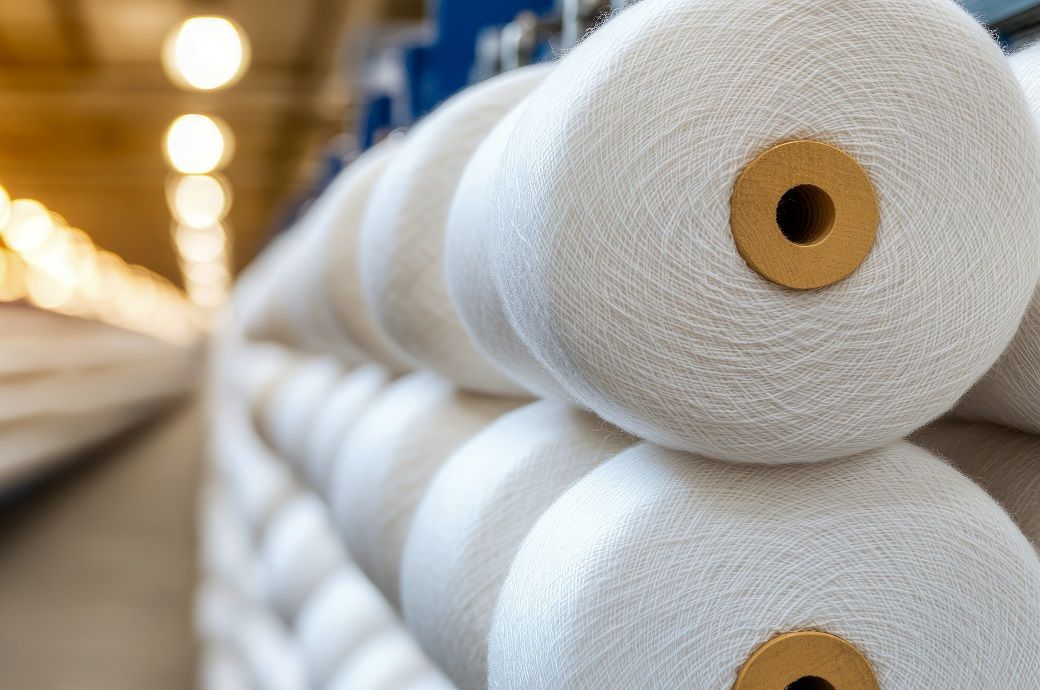
Cotton yarn prices did not see significant movement in the Ludhiana market. The market experienced weak demand from the downstream industry. A trader from the Ludhiana market told Fibre2Fashion, “Cotton yarn trade noticed silent demand as summer demand is still weak. The downstream industry is not sure about good demand for finished products in the coming months. Spinning mills are focusing on the export market due to the weaker Indian currency. Cheaper imported cotton has also provided an opportunity for the global market.”
In Ludhiana, 30 count cotton combed yarn was sold at ₹257-267 (approximately $2.99-3.11) per kg (inclusive of GST); 20 and 25 count combed yarn were traded at ₹247-257 (approximately $2.88-2.99) per kg and ₹252-262 (approximately $2.93-3.05) per kg, respectively. Carded yarn of 30 count was noted at ₹237-242 (approximately $2.76-2.82) per kg today, according to trade sources.
The Delhi market also witnessed steadiness in cotton yarn prices. According to market sources, buyers are still cautious about fresh deals. The market is facing price disparity due to higher cotton prices and tough competition in the export market. A trader said that the falling rupee has provided much needed relief to yarn exporters, but the domestic consumer industry remains cautious regarding domestic demand for the coming summer season.
In this market, 30 count combed knitting yarn was traded at ₹260-262 (approximately $3.03-3.05) per kg (GST extra), 40 count combed at ₹282-290 (approximately $3.28-3.38) per kg, 30 count carded at ₹237-239 (approximately $2.76-2.78) per kg, and 40 count carded at ₹262-265 (approximately $3.05-3.09) per kg today.
India’s home textile hub, Panipat, noticed stability in recycled yarn prices amid weak demand. However, recycled polyester fibre prices increased by ₹1 per kg as Indian polyester fibre manufacturers hiked the prices of virgin PSF due to an increase in crude oil prices. A trader from the market said that recycled yarn buying has yet to pick up in the new year. The market expects demand for summer items of home textiles, like bed sheets and pillow covers, but it is unclear when the demand will pick up.
In Panipat, 10s recycled PC yarn (Grey) was traded at ₹78-82 (approximately $0.91-0.95) per kg (GST paid). Other varieties and counts were noted as follows: 10s recycled PC yarn (Black) at ₹53-56 (approximately $0.62-0.65) per kg, 20s recycled PC yarn (Grey) at ₹96-102 (approximately $1.12-1.19) per kg, and 30s recycled PC yarn (Grey) at ₹130-135 (approximately $1.51-1.57) per kg. Cotton comber prices were noted at ₹102-108 (approximately $1.19-1.26) per kg, while recycled polyester fibre (PET bottle fibre) was recorded at ₹79-81 (approximately $0.92-0.94) per kg today.
In North India, cotton prices remained steady amid limited arrivals and cautious buying by spinning mills. The natural fibre was traded at previous levels in North Indian markets. However, cotton and seed cotton have noticed a rise in the last couple of days amid changing market dynamics. Traders said that cotton arrivals remained stable in the market as the total output is likely to remain lower. Although the Cotton Corporation of India (CCI) is buying seed cotton in nominal quantities in North India, ginners are purchasing aggressively, which has driven seed cotton prices upward. They expect that cotton prices will receive a boost in two months when arrivals decline in the country. CCI’s cotton stock will remain blocked for the next couple of months. It is currently selling last season’s cotton stock to clear its warehouses.
North India’s cotton arrival was 11,600 bales of 170 kg, comprising 600 bales in Punjab, 3,000 bales in Haryana, 4,000 bales in upper Rajasthan, and 4,000 bales in lower Rajasthan. Cotton prices in Punjab ranged from ₹5,560 to ₹5,570 (approximately $64.75-64.86) per maund of 37.2 kg, while in Haryana, prices ranged from ₹5,550 to ₹5,570 (approximately $64.63-64.86). In upper Rajasthan, cotton was priced between ₹5,570 and ₹5,590 (approximately $64.86-65.09) per maund. In lower Rajasthan, it was priced at ₹53,100 to ₹54,200 (approximately $618.34-631.15) per candy of 356 kg. Meanwhile, seed cotton was priced at ₹7,100-7,500 (approximately $82.68-87.34) per quintal of 100 kg.
ALCHEMPro News Desk (KUL)
Receive daily prices and market insights straight to your inbox. Subscribe to AlchemPro Weekly!